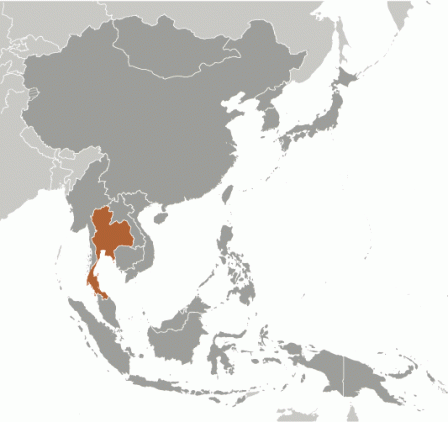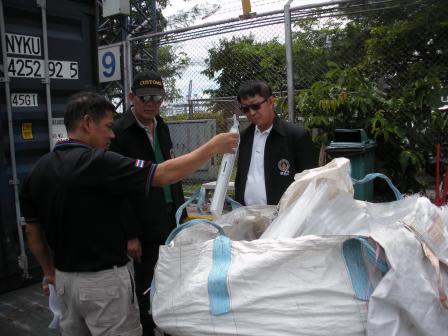EPA Collaboration with Thailand

EPA has a long and successful history of cooperating with Thailand to improve enforcement of environmental law, raise public awareness of and engagement in environmental issues, and improve air quality. Many of our joint programs achieved successes and became models for EPA’s partnerships with other countries in Asia.
Explore our work in Thailand:
- Building Strong Institutions and Legal Structures
- Improving Air Quality for a Healthier Tomorrow
- Reducing Exposure to Toxic Chemicals
- Cleaning Up E-Waste, a Global Responsibility
Building Strong Institutions and Legal Structures
 EPA and Thai officials conduct a mock inspection of a shipping container as part of port inspections training in Thailand
EPA and Thai officials conduct a mock inspection of a shipping container as part of port inspections training in ThailandEnforcing Environmental Law: Thailand and EPA recognize the importance of effective enforcement of environmental law. EPA and Thailand Pollution Control Department (PCD) are active in the Asian Environmental Compliance and Enforcement Network (AECEN), which brings together enforcement officials from 13 countries to improve compliance with environmental laws and policies in Asia.
Learn More:
- Thailand Pollution Control Department Exit
- Asian Environmental Compliance and Enforcement Network Exit
Promoting Environmental Security at Seaports: EPA supports the International Network for Environmental Compliance and Enforcement (INECE) Seaport Environmental Security Network (SESN), an international organization of enforcement officials responsible for import and export of environmentally-regulated substances. Thailand is an active participant in the Network.
- Recently: In August 2016, EPA and SESN held a 3-day workshop and field exercise for Thai customs officials at Laem Chabang, the home of Thailand’s largest port. Participants in this course learned techniques for detecting hazardous materials at ports, as well as practical models for communication between agencies on illegal shipments.
- Learn More: Seaport Environmental Security Network Exit
Improving Air Quality for a Healthier Tomorrow
 Students in Thailand learned how to measure air quality during a ‘Kids Making Sense’ workshop hosted EPA and its partners.
Students in Thailand learned how to measure air quality during a ‘Kids Making Sense’ workshop hosted EPA and its partners. Air Quality Education: EPA and Thailand recognize the importance of raising public awareness of air quality, particularly through working with students.
- Recently: In June 2016, EPA, National Science Museum Thailand (NSM), EPA Taiwan, the Asian and Pacific Islander Obesity Prevention Alliance (APIOPA), and students from both the U.S. and Taiwan partnered to hold two “Kids Making Sense” air quality workshops for students in Thailand. During the workshops, approximately 20 teachers and 60 students learned about air quality and the health impacts of air pollution, as well as how to measure air quality in their own neighborhoods using hand-held air quality sensors.
Learn more:
- Kids Making Sense Exit
- National Science Museum Thailand Exit
- Asian and Pacific Islander Obesity Prevention Alliance Exit
- EPA’s collaboration with EPA Taiwan
 Thai officials participate in a training on EPA’s Environmental Benefits Mapping and Analysis Program-Community Edition (BenMAP-CE) tool.
Thai officials participate in a training on EPA’s Environmental Benefits Mapping and Analysis Program-Community Edition (BenMAP-CE) tool.Air Quality Training: In 2015, EPA and Thailand Pollution Control Department hosted three regional workshops on air quality. These workshops highlighted EPA tools: AirNow International, Environmental Benefits Mapping and Analysis Program - Community Edition (BenMAP-CE), and Air Benefit and Cost and Attainment Assessment System (ABaCAS).
Through these trainings, participants learned how to use these tools in their countries to monitor air quality and estimate health impacts of air pollution. Also, based on EPA's Air Pollution Training Institute, the Thailand Air Pollution Center of Excellence (TAPCE) provides Thai public officials, private sector officers, and students critical skills to implement Thailand's environmental programs and policies. Course topics include air toxics, permit writing, and ambient air monitoring.
Recently, Mr. Mark Kasman of EPA sat down to talk with Dr. Supat Wangwongwatana, former Director of the Thailand Pollution Control Department, to discuss the factors which led to successfully phasing out lead in gasoline in Thailand and improving air quality for the next generation. Watch their video about collaboration between the USEPA and Thailand Pollution Control Department to improve air quality. Exit
Learn more:
- AirNow-International
- BenMAP
- ABaCAS Exit
- Thailand Air Pollution Center of Excellence (TAPCE) Exit
- EPA's Air Pollution Training Institute Exit
Reducing Exposure to Toxic Chemicals
Mercury is a potent neurotoxicant that negatively impacts human health and the environment. To better understand the atmospheric movement of mercury, the Thailand Ministry of Natural Resources and Environment (MNRE) participates in the Asia-Pacific Mercury Monitoring Network (APMMN) hosted by EPA, EPA Taiwan and the National Atmospheric Deposition Program. Through APMMN, MNRE is monitoring mercury in rainwater and sharing data with other countries in the network to contribute to regional understanding of where mercury travels and deposits.
- Recently: The fifth APMMN Meeting was held in Bangkok, Thailand in July 2016. This meeting was attended by 80 delegates from 16 nations. Participants learned about the status of mercury monitoring across the network and techniques for wet deposition mercury monitoring.
Learn More:
- Asia-Pacific Mercury Monitoring Network (APMMN) Exit
- Thailand Ministry of Natural Resources and the Environment (MNRE) Exit
Cleaning Up E-Waste, a Global Responsibility
Managing electronic waste is a global challenge. Thailand is a member of the International E-Waste Management Network (IEMN) hosted by EPA and EPA Taiwan. Through their participation in the network, the Thailand Pollution Control Department has shared its experiences related to e-waste management, learned from officials across the region, and participated in workshops on e-waste management in the U.S. and Taiwan. Through these discussions, Thailand has gained knowledge about successful models and approaches for managing electronic waste, as well as strategies to engage critical stakeholders.
Learn more:
- International E-Waste Management Network (IEMN)
- EPA’s collaboration with EPA Taiwan
- EPA's international efforts to clean up e-waste
